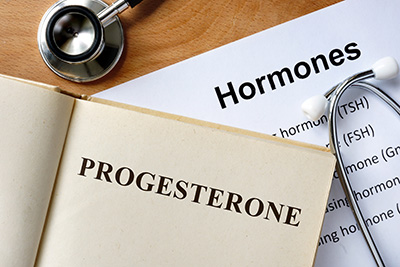
Progesterone is one of the first hormones to decline in women starting around age 35. When levels start to fall, women may experience anxiety, panic attacks, lighter sleep, PMS, headaches, mood swings, fibroids, breast and ovarian cysts, heavier or irregular bleeding, and abdominal weight gain. Supplementing Progesterone as part of a Bioidentical Hormone Replacement Therapy plan can help alleviate these symptoms and rebalance the body’s hormones.
Progesterone, with estrogen, regulates the menstrual cycle. It is essential for creating and maintaining a pregnancy and balancing other effects of estrogen. Progesterone is produced by the ovary, placenta, and adrenal glands in women and a small amount is produced by the adrenal glands in men.
Progesterone is responsible for regulating several bodily functions. It plays an important role in brain function and is often called the “feel good hormone” because of its mood-enhancing and anti-depressant effects. Optimum levels of progesterone promote feelings of calm and well-being, while low levels can cause anxiety, irritability, and anger.
Estrogen is “pro-growth” (causing the cells in the uterus to multiply during a menstrual cycle), and progesterone is “anti-growth”. Progesterone balances the stimulating/pro-growth effects of estrogen on breast and endometrial tissue and helps protect against endometrial and breast cancer. It also balances the following effects of excess estrogen: water retention, fat accumulation, and uterine bleeding. Progesterone is a diuretic and rids the body of excess salt and water.
It enhances the sensitivity of the body to insulin and therefore helps to maintain normal blood sugar levels. It also builds bone and benefits the cardiovascular system by blocking plaque formation in the blood vessels and lowering triglyceride levels. Progesterone increases libido, improves mood, promotes the breakdown of fat,increases energy and aids thyroid function. It plays an important role in reducing or helping prevent motor, cognitive, and sensory impairments in both men and women.
Low levels of progesterone can be caused by several mechanisms. Excessive stress lowers progesterone levels because progesterone will be converted to cortisol to fight the stress. In addition, poor food choices, inadequate sleep, and lack of exercise can lead to progesterone deficiency.